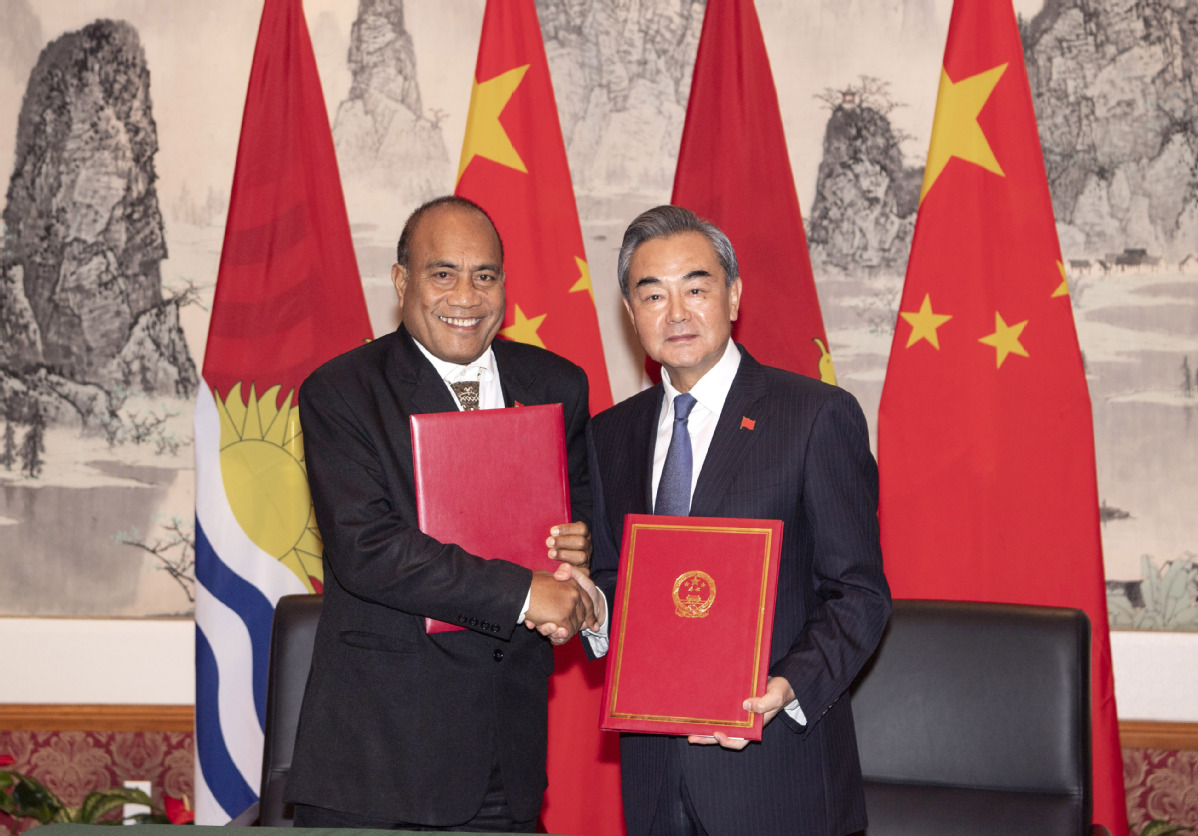China and Kiribati formally resume diplomatic relations
By KONG WENZHENG in New York | China Daily Global | Updated: 2019-09-28 01:35

China and Kiribati formally resumed diplomatic relations on Friday, after the central Pacific island country severed the so-called “diplomatic ties” with the Taiwan on September 20.
Chinese State Councilor and Foreign Minister Wang Yi and Kiribati's President and Foreign Minister Taneti Mamau signed the joint communique on restoring bilateral ties at the United Nations in New York.
The communique stated that following the interests and desire of the two peoples, the two countries have decided to re-establish diplomatic relations at the ambassadorial level effective from the date of signature of the communique.
The government of Kiribati recognizes that there is but one China in the world, said the communique. The government of the People's Republic of China is the sole legitimate government representing the whole of China, and Taiwan is an inalienable part of China's territory, it said.
According to the communique, the government of Kiribati has committed to immediately cut “diplomatic relations” with Taiwan and pledged not to develop any official relations or exchanges with Taiwan.
Kiribati was the seventh country to break ties with Taiwan and establish diplomatic relations with China since 2016, when Tsai Ing-wen became the leader of the island. The island now retains official ties with 15 nations.
Resumption of China-Kiribati ties boosted the number of countries China has formed diplomatic relations with to 180.
China highly appreciated Kiribati's decision, said Wang in a news conference following the signing ceremony.
Forty-eight years after the United Nations General Assembly passed Resolution 2758 that endorses the one-China policy, the re-establishment of China-Kiribati relationship proves that the policy accords with wills of the people, Wang said.
It is an irresistible historical trend that no one could change or oppose, he added.
He said that Kiribati could henceforth conduct mutually beneficial cooperation with China — a significant force with a population of 1.4 billion, and the two countries could share development opportunities.
According to the communique, both countries have agreed to develop friendly relations based on the principles of mutual respect for sovereignty and territorial integrity, mutual non-aggression, non-interference in each other's internal affairs, equality, mutual benefit and peaceful coexistence.
As developing countries, the two nations face the same long-term mission of ensuring economic development and improving people's livelihood despite their differences in size and social system, Wang said.
Echoing his point, Mamau said that the country could learn and gain much from the PRC as both are developing countries.
“The establishment of our diplomatic relations is just a beginning,” he said, adding that he is looking forward to cooperation between the two governments to renew partnerships for bilateral cooperation.
Wang said that China is willing to provide assistance within its capacity and help Kiribati achieve independent and sustainable development based on mutual respects and equality.
China will increasingly coordinate with Kiribati on regional and international issues and protect the legitimate rights of developing countries, he added.
Mamau said he is “confident that this partnership will bring benefits to the people of Kiribati,” he said, adding that the decision is in line with the fundamental and long-term interests of Kiribati and its people.
He continued to acknowledge China’s leadership role and influence on the international stage, and he “look forward to China's leadership and supports at the multilateral level,” said Mamau,
Kiribati initially established diplomatic relations with the People's Republic of China in 1980, but the relationship was disrupted after it established "diplomatic ties" with Taiwan in 2003.
























